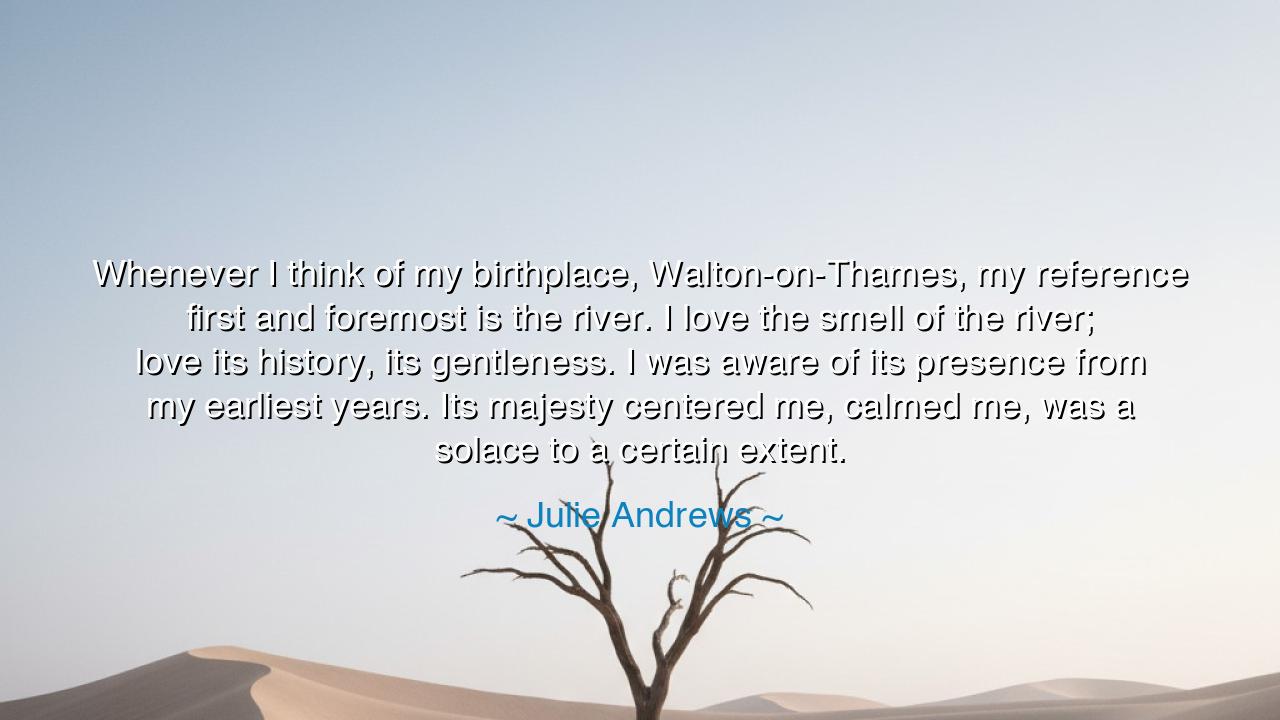
Whenever I think of my birthplace, Walton-on-Thames, my reference
Whenever I think of my birthplace, Walton-on-Thames, my reference first and foremost is the river. I love the smell of the river; love its history, its gentleness. I was aware of its presence from my earliest years. Its majesty centered me, calmed me, was a solace to a certain extent.






When Julie Andrews, the luminous voice of stage and screen, spoke the words, “Whenever I think of my birthplace, Walton-on-Thames, my reference first and foremost is the river. I love the smell of the river; love its history, its gentleness. I was aware of its presence from my earliest years. Its majesty centered me, calmed me, was a solace to a certain extent,” she gave voice to something both intimate and eternal. In her words lies the profound connection between place and spirit, between the quiet constancy of nature and the shaping of the soul. Hers is not merely a memory, but a meditation — a recognition that where we come from lives forever within us, flowing through our being like the river she so loved.
The origin of this quote is rooted in Andrews’ reflections on her early life in Walton-on-Thames, a small English town resting along the banks of the River Thames. Before she became the global icon of Mary Poppins and The Sound of Music, she was a child of modest means, raised in an England still healing from the wounds of war. Amid the uncertainty of that time, the river became her silent companion — a source of stability, grace, and reflection. The Thames, ancient and enduring, had flowed through centuries of history and poetry; it had seen kings and paupers, peace and ruin, and yet it moved always forward. For the young Julie, it was both a teacher and a friend, whispering to her that life, like water, could be calm and yet powerful, gentle yet unstoppable.
In her words, we hear the tone of reverence, not for grandeur or fame, but for the simple majesty of stillness. “I love its gentleness,” she says — and in that gentleness lies strength. The river did not shout or command; it moved with patience, wearing away stone, shaping valleys, sustaining life without noise. It is as though the river taught her the virtues she would one day embody: grace, balance, composure, and quiet perseverance. To be “centered,” as she says, is to live as the river lives — steadfast amid the currents, reflecting the light without grasping for it.
History too offers us echoes of this truth. The ancient Stoics often spoke of the river as the perfect symbol of existence. Marcus Aurelius, in his meditations, likened life to a flowing stream — ever-changing, yet always continuous. The philosopher Heraclitus wrote that no one steps into the same river twice, for both the river and the person have changed. Julie Andrews, in her own way, understood this timeless wisdom. The river of her youth was both her beginning and her becoming. It held her still when life was turbulent, and as fame carried her across oceans, it remained the unchanging rhythm in her soul — the origin of her calm.
There is something deeply human in this connection. Each of us, if we look closely, has a “river” — a grounding force that returns us to ourselves when the noise of the world grows too loud. It may be a memory, a place, a sound, or a person — something that reminds us who we are when we are in danger of forgetting. For Andrews, the Thames was that sacred thread. Whenever she thought of home, she did not recall buildings or faces first, but the smell of the water, the shimmer of its surface, the whisper of its flow. That was her anchor, her reminder that even in the chaos of fame, the essence of peace lay not in grandeur, but in presence.
From her reflection emerges a lesson for all: find your river. In a world that rushes endlessly forward, filled with distraction and noise, seek the stillness that nourishes your spirit. Remember the places and moments that make you whole, and return to them in thought or in deed when life feels unsteady. For to be “centered,” as Andrews was, is not to stand apart from the world, but to flow through it with grace — to move, yet remain rooted in something timeless.
And so, dear listener, take her words as both comfort and counsel. Honor the places that formed you, for they are not accidents of geography, but gifts of destiny. Look for the rivers in your own life — those quiet sources of peace that remind you of what endures. Let them teach you as they taught Julie Andrews: that majesty can be gentle, that calmness can be powerful, and that, no matter how far you travel, the soul’s true solace flows from its beginnings. For in remembering where we came from, we remember who we are — and like the river, we find our strength in the steady movement between stillness and change.






AAdministratorAdministrator
Welcome, honored guests. Please leave a comment, we will respond soon